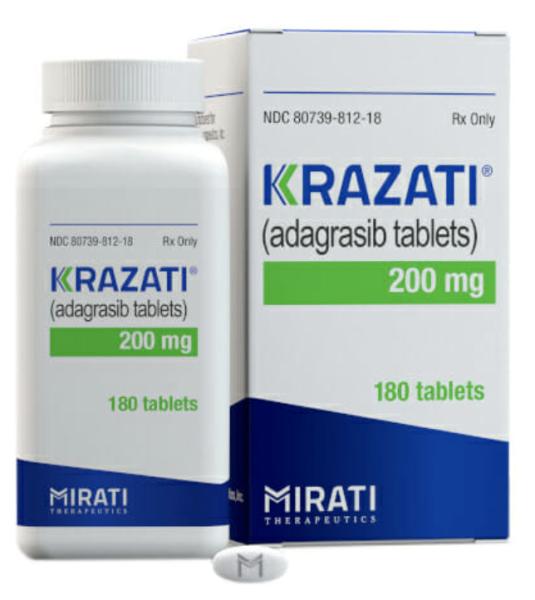Adagrasib Dosage
Medically reviewed by Drugs.com. Last updated on Feb 25, 2025.
Applies to the following strengths: 200 mg
Usual Adult Dose for:
Additional dosage information:
Usual Adult Dose for Non-Small Cell Lung Cancer
600 mg orally twice daily
Duration of therapy: Until disease progression or unacceptable toxicity.
Comments:
- Administer this drug at the same time every day, with or without food.
- If a dose of this drug is missed by more than 4 hours, skip the dose and resume dosing at the next scheduled time.
- In case of vomiting after taking a dose, do not take another dose. Resume dosing at the next scheduled time.
Use: For the treatment of adult patients with KRAS G12C-mutated locally advanced or metastatic non-small cell lung cancer (NSCLC), who received at least one prior treatment for their cancer.
Renal Dose Adjustments
Data not available
Liver Dose Adjustments
Data not available
Dose Adjustments
Maximum of two dose reductions are permitted:
- First dose reduction: 400 mg twice daily
- Second dose reduction: 600 mg once daily
Permanently discontinue this drug in patients who are unable to tolerate 600 mg once daily.
Refer to manufacturer product information for full details on dose modification and management of adverse reactions.
Nausea or vomiting despite appropriate supportive care (including anti-emetic therapy):
Grade 3 or 4:
- Withhold the dose until the severity reduces to grade 1 or lower or returns to baseline.
- Resume treatment with this drug at the next lower dose level.
Diarrhea despite appropriate supportive care (including antidiarrheal therapy):
Grade 3 or 4:
- Withhold the dose until the severity reduces to grade 1 or lower or returns to baseline.
- Resume treatment with this drug at the next lower dose level.
QTc Interval Prolongation:
QTc absolute value greater than 500 ms or greater than an increase of 60 ms from baseline:
- Withhold the dose until the QTc interval is less than 481 ms or returns to baseline.
- Resume treatment with this drug at the next lower dose level.
Torsade de pointes, polymorphic ventricular tachycardia or signs or symptoms of serious or life-threatening arrhythmia:
- Permanently discontinue this drug.
Hepatotoxicity:
Grade 2:
- Reduce dose at the next lower dose level.
- Withhold the dose until the severity reduces to grade 1 or lower or returns to baseline.
- Resume treatment with this drug at the next lower dose level.
- Permanently discontinue this drug.
Interstitial Lung Disease/Pneumonitis:
Any Grade:
- Withhold the treatment with this drug if ILD/pneumonitis is suspected.
- Permanently discontinue this drug if ILD/pneumonitis is confirmed.
Other Adverse Reactions:
Grade 3 or 4:
- Withhold the dose until the severity reduces to grade 1 or lower or returns to baseline.
- Resume treatment with this drug at the next lower dose level.
Precautions
CONTRAINDICATIONS: None
Safety and efficacy have not been established in patients younger than 18 years.
Consult WARNINGS section for additional precautions.
Dialysis
Data not available
Other Comments
Administration advice:
- Administer this drug to patients with the KRAS G12C mutation.
- Swallow tablets whole. Do not chew, crush or split tablets.
Storage requirements:
- Store at room temperature, 20C to 25C (68F to 77F) excursions between 15C and 30C (59F to 86F) are permitted.
General:
- This drug is approved under accelerated approval based on objective response rate (ORR) and duration of response (DOR).
- Information on FDA-approved tests for the detection of a KRAS G12C mutation is available at: https://www.fda.gov/CompanionDiagnostics
Monitoring:
- Gastrointestinal: Diarrhea, nausea, and vomiting.
- Cardiovascular: Electrocardiogram (ECG) and electrolytes.
- Hepatic: Liver function (prior to and during therapy).
- Respiratory: New or worsening respiratory symptoms.
Patient advice:
- Read the FDA-approved patient labeling (Patient Information).
- Inform health care provider if you have heart problems, including heart failure, congenital long QT syndrome, or liver problems.
- Notify health care provider about all concomitant medications, including prescription medicines, over-the-counter drugs, vitamins, and herbal products.
- Notify health care provider if you are pregnant or intend to become pregnant during therapy.
- Use this drug as directed by healthcare provider.
- Do not change the dose or discontinue therapy this drug unless your healthcare provider tells you to.
- Avoid breastfeeding during treatment with this drug and for 1 week after the last dose.
- Severe gastrointestinal adverse reactions may occur with the use of this drug; contact your health care provider if signs or symptoms of severe or persistent gastrointestinal adverse reactions are experienced.
- QTc interval prolongation is likely with the use of this drug; contact health care provider if signs or symptoms of heart arrhythmias are experienced.
- Hepatotoxicity is likely with the use of this drug; immediately contact health care provider if signs or symptoms of liver dysfunction are experienced.
- This drug may cause interstitial lung disease (ILD) or pneumonitis; contact healthcare provider immediately if you notice any new or worsening respiratory symptoms.
- This drug has the potential to cause infertility in both males and females.
More about adagrasib
- Check interactions
- Compare alternatives
- Side effects
- During pregnancy
- Drug class: miscellaneous antineoplastics
- Breastfeeding
- En español
Patient resources
Other brands
Professional resources
Other brands
Related treatment guides
Further information
Always consult your healthcare provider to ensure the information displayed on this page applies to your personal circumstances.


